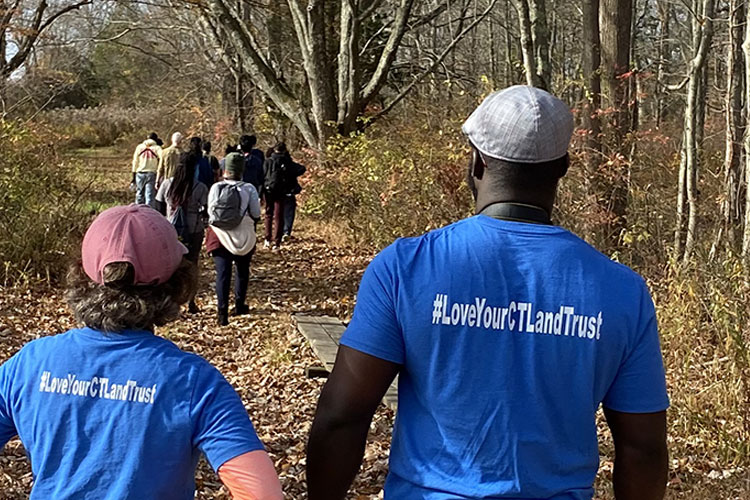News

The 2021 regular legislative session wrapped up on June 9, followed by a short special session to address unfinished business. With the Capitol closed throughout the year, all public hearings were convened via Zoom. Hallway conversations and office meetings with legislators and the administration were replaced by text messages and phone calls.
To say that it was a legislative session like no other is an understatement.
Yet, as always, you stepped up when we needed you. Your efforts – including contacting your legislators, submitting testimony, and sharing action alerts with your land trust members – made a difference, notching some important advances for land conservation priorities, including the following:
Bond Authorizations Benefit Land Conservation Programs
- Open Space Grant Program: The Bond Bill authorized $10 million/year for CT DEEP’s Open Space and Watershed Land Acquisition (OSWA) grant program. After years of funding shortfalls for the program, CLCC and our partners pushed hard to support DEEP’s request for this much-needed bonding.
- Recreational Trails: CT DEEP’s Recreational Trails & Greenways Program grants program received an authorization of $3 million/year to support community and nonprofit construction of new trails; maintenance and restoration of existing trails; remediation of trails for accessibility by persons with disabilities; acquisition of land or easements for trails and trail corridors; and other related activities.
- Climate Resiliency: In accordance with the Governor’s FY 2022-23 Budget recommendations, the Connecticut General Assembly also approved $30M for the biennium in microgrid and resilience bonding to help fund adaptation and resilience programs and projects by municipalities, nonprofits, and academic institutions, including green infrastructure.
A big thanks to the Bonding Subcommittee and the Connecticut General Assembly for recognizing the importance of investing in OSWA and these other important programs at a time when new federal dollars for land conservation and climate resilience are expected to benefit the state at unprecedented levels.
Community Investment Act and Passport to Parks Accounts Safe for Now
- The Community Investment Act (CIA) account emerged from the budget and legislative process unscathed. There were no proposed diversions, cuts or additional categories of use which would dilute the efficacy of this critical source of dedicated funding for OSWA, farmland/dairy support, historic preservation and affordable housing programs. The CIA is also the only source of funding for DEEP’s Urban Green and Community Garden Grant Program, which also saw an unprecedented level of demand for funding in 2020.
- The Passport to the Parks Program stayed intact despite proposals to weaken the program through exceptions to the $5/vehicle/year DMV registration fee. It also received an increase of $2.5 million/year as part of the approved FY 2022-23 Budget. The dedicated fund generates about $20 million/year for operating and maintaining State Parks.
Mixed News for Climate Change Bill
- HB 6441, An Act Concerning Climate Change Adaptation was a top priority for CLCC and conservation advocates. The passage of the bill results in new tools to help municipalities adapt to climate change, including the authority to establish stormwater authorities and expanding flood and erosion control boards to address climate resiliency. The bill also expands the authority of the Connecticut Green Bank to establish and manage an Environmental Infrastructure Fund.
However, much to our disappointment, the final bill was stripped of Section 4, which gave municipalities an option to establish a local conveyance fee on real property to fund climate adaptation, resilience, affordable housing, land conservation, and other community projects. This is truly unfortunate – cutting off an opportunity for towns, especially urban areas, to raise much needed funds to match federal climate program investments that require a local match.
View CLCC and Audubon CT’s Statement regarding the removal of Section 4 »
View CLCC’s testimony in support of HB 6441 »
No Vote on Transportation Climate Initiative Program Legislation
- The legislature did not vote on SB 884, legislation to implement the Transportation Climate Initiative Program (TCI-P).The proposal was also eliminated from the Governor’s Budget in the final days of the session. TCI-P is a partnership with neighboring states to implement a regional program that caps CO2 emissions from gasoline and on-road diesel fuel. The legislation proposed changes and initiatives that would generate investments in communities for transportation related projects, with at least 35% of the TCI-P proceeds slated for communities most negatively impacted by air pollution and underserved by the transportation system.
CLCC weighed in on many other bills including:
(Support) SB 971, which will allow monies held in municipal Climate Change and Coastal Resiliency Reserve Funds to be invested in trust funds administered, held, or invested by the State Treasurer. View CLCC’s testimony here »
(Support) HB 6496 helps to recognize the importance of healthy soils to our environment and the state’s efforts to mitigate the impacts of climate change. View CLCC’s testimony here »
(Support) HB5726, (approved through House Amendment A on HB 6484) which will permit any town irrespective of population to seize an ATV operated in violation of a municipal ordinance, thereby expanding the tools available to law enforcement seeking to control and deter the illegal use of ATVs in their community. View CLCC’s testimony here »
(Support) HJ53, A Resolution adopting The Long Island Sound Blue Plan
View CLCC’s testimony here »
View all of CLCC’s 2021 testimony and policy comments here »
Thank you for continuing to be vocal, strong, and relentless in taking action on legislation and policies that will protect our land, water, and other natural resources, address climate change, and invest in our communities. Hands down, it is YOUR advocacy that makes the difference every session. We are grateful to have you on our team!
![types] types]](https://ctconservation.org/wp-content/uploads/Amy-with-two-Dogs.jpg)
Tags:

